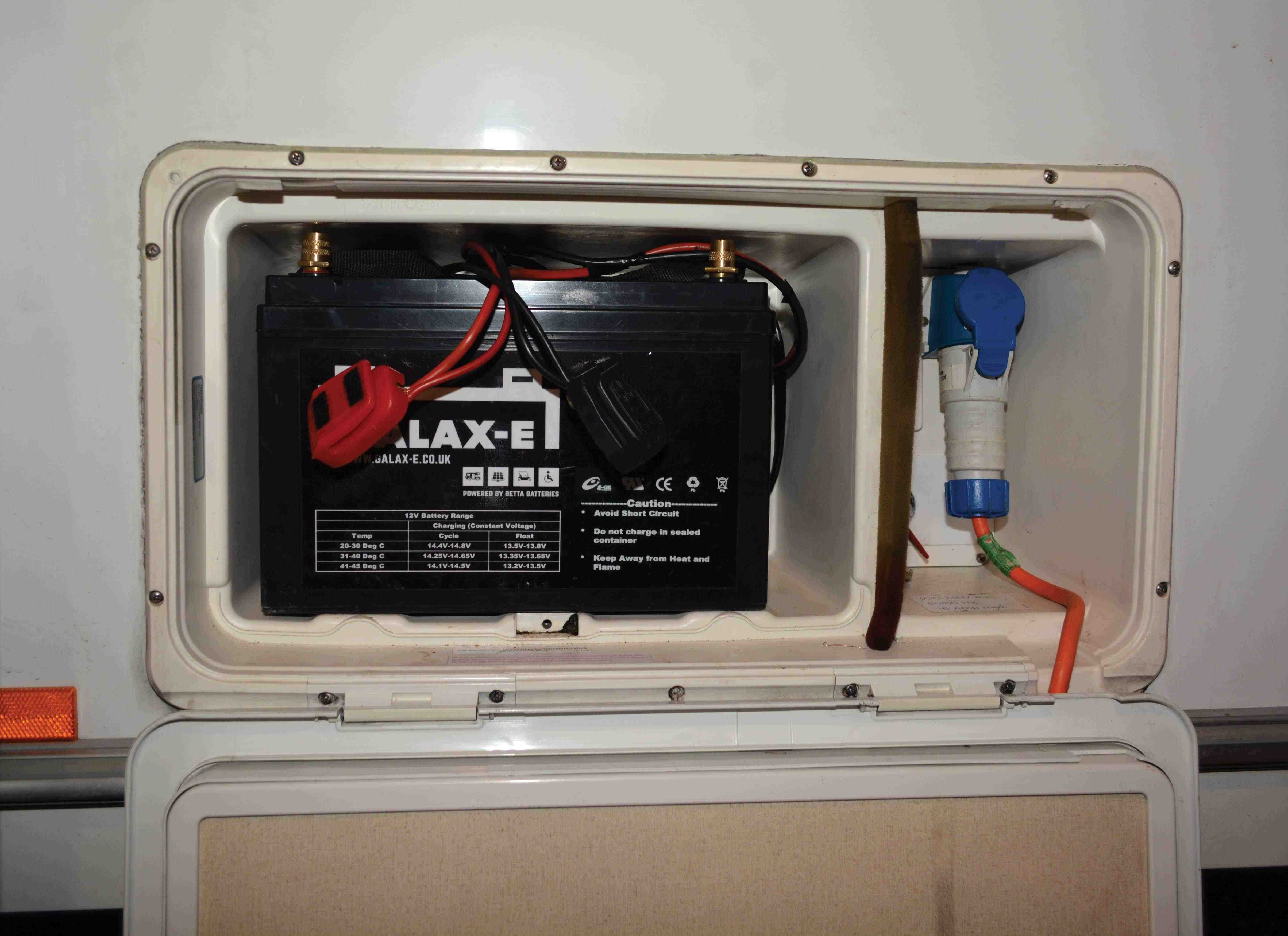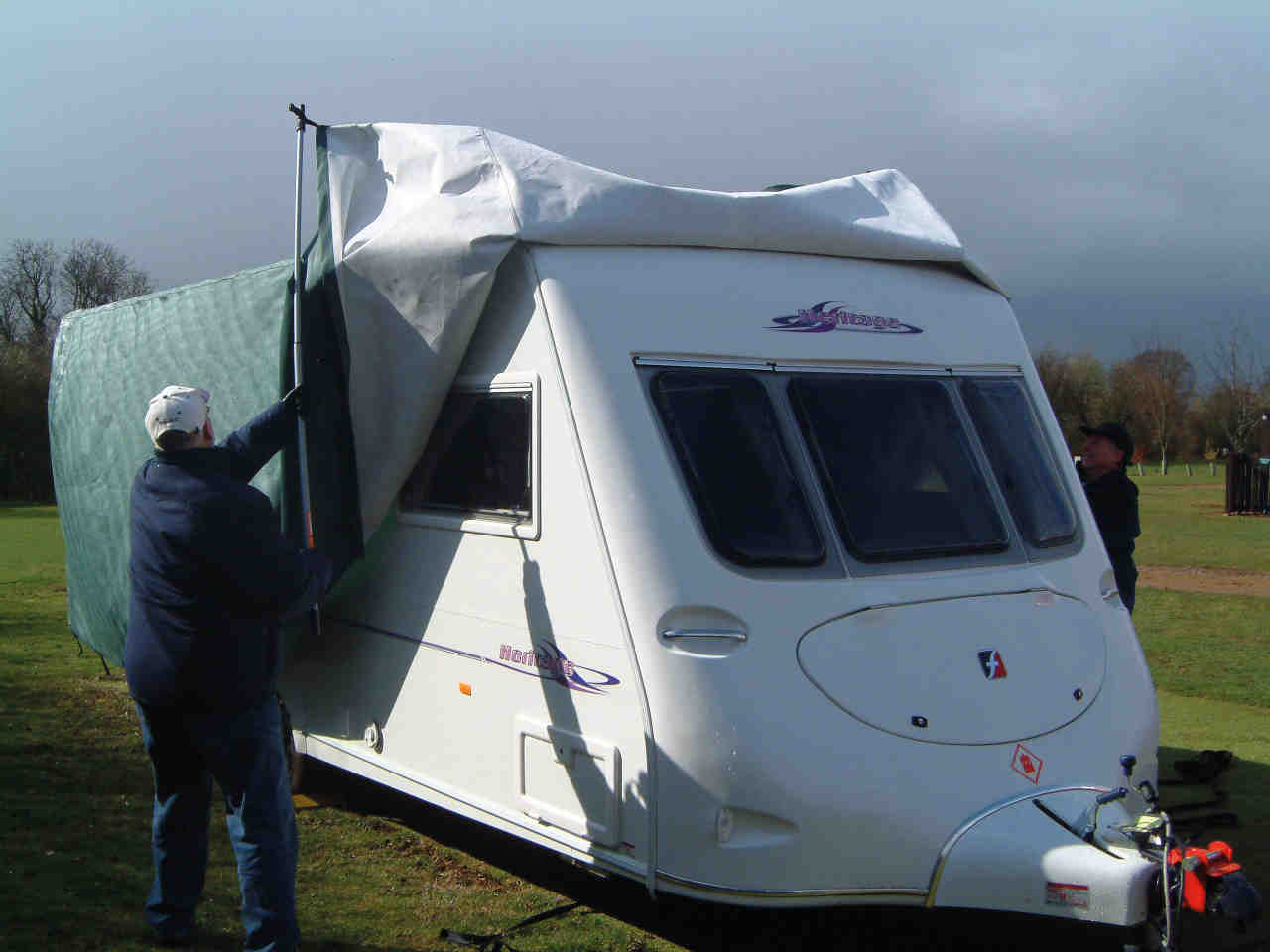
Sockets for stowing the 12S and 12N sockets should have drainage holes
Having the ability to hook up your caravan to a 230V electricity supply throughout winter can have advantages, not least the fact that you can power up any systems, such as the heating, from time to time, as well as keeping items like the battery charged. For many, however, this is not an option and you need to consider alternatives.
Leisure batteries are often among the casualties of long periods without use. If left in the unit, ensure the battery is kept fully charged and isolated from all 12V equipment by means of the unit's isolation switch or disconnect it. Alternatively, ensure all interior electrical items are in the off position and disconnect any plugs. Don't forget the TV aerial booster in the cupboard, if fitted. Anything left on standby mode is still draining the battery, even the voltmeter on the control panel.
Remember, even when disconnected a battery will discharge over time and once left in a discharged state its storage capacity can never be fully restored.

The best way to store a leisure battery is to disconnect it or isolate it from all 12V equipment using the unit’s isolation switch and keep it fully charged while in storage
If feasible, disconnect the battery and take it home where you can charge it periodically. A battery should not be left much more than six weeks before re-charging less if the battery needs to remain connected to operate a security system. If your caravan has a tracker or other security system this needs a source of power, which will probably mean leaving your caravan battery in situ and finding a way of charging it on-site or use a 30w or larger solar panel to maintain it. Wherever you keep your battery, clean over the terminals and smear them with petroleum jelly.
Gas systems
Wherever you're storing your caravan, it is essential that the gas valves on top of the cylinders are closed or the regulators (if a clip-on type) are disconnected from the cylinders and caps or cloths are fitted over the ends of any open pipework.

Make sure the valves on the top of gas cylinders are closed or the regulators disconnected and caps fitted
If you're putting your unit into storage, check with the storage operator regarding its gas cylinder policies. Some don't allow you to store cylinders with your unit for any length of time. If you can store the cylinders in the dedicated gas locker of your unit so much the better. Alternatively, they should be stored in the open air in a secure place. Storing in a shed or garage is not recommended as in the case of a fire the fire service will be unaware of presence of the cylinders, whereas a fire in or near to a caravan or motorhome immediately suggests the likely presence of gas cylinders.
Wherever they are located, cylinders should be stored at least two metres from open drains, openings into cellars (LPG being heavier than air) or buildings. The cylinders should also be kept away from heat and readily-ignitable materials and corrosive, toxic or oxidant materials. When removed from the unit's gas locker, plastic caps or plugs should be fitted to the gas cylinder's outlet. When handling, connecting and disconnecting gas cylinders ensure engines and electrical equipment are switched off.
To help preserve the exterior of your unit and ease the chore of cleaning it before your first spring outing you may wish to consider either a breathable cover or the use of a protective coating, such as Fenwicks Overwintering Fluid.
When choosing a cover it's important for it to be breathable, soft enough not to damage the caravan surface and tough enough for longevity. The alternative of a waxy protective coating has the advantage of low cost and if you leave it on all winter it is relatively easy to wash off in spring because of the natural degradation of the coating. All caravan covers have a limited life, but some inferior products can last little more than one season. The main problem is ultra-violet light degradation. Consider the cover as sacrificial, it's better the cover degrades than your GRP panels discolouring.

Fitting a caravan cover is easier with at least two people
If you use your cover throughout the year and so expose it to summer sun, consider a lighter colour to help reduce heat build-up. Also expect its life expectancy to reduce. Generally, you get what you pay for here, from cheap imported products right up to premium, custom-made items not only are the custom made a much better fit the quality and workmanship is superior. Do ensure it's the right size for your van with the doorway in the right location and provision for the protruding external fittings such as a roof aerial and gas flue. Another life-shortening aspect of caravan construction to covers is the sharp ends of aluminium awning rails and roof joint strips. The cover needs to be protected at such points with robust material to prevent premature wear. Before fitting a cover it is essential that the surface of the unit is clean and dry, otherwise even with the softest of covers a surface layer of dirt and grit will damage your paintwork as the cover moves against the side of the unit.
Take particular care to ensure the windows are clean as the soft acrylic material scratches easily.
Ignore any advice to protect the windows with cling film before fitting the cover as this is not wise and may cause cracking to the windows.
Top tips
- Check your caravan handbook for any specific advice it may offer on winter preparation. Also, it's always worth checking with the supplier of any additional equipment you may have had fitted for advice on over-wintering.
- Even if you're leaving your van in storage away from home, return every now and then for a check that all's well. It's also the chance to open windows and rooflights to allow some fresh air to circulate. Likewise, an occasional blast of warm air from the heating system can also work wonders, but don't forget if using butane gas for heating it won't work as the temperature approaches zero.

- Winter is a good time to have your caravan serviced by an industry recognised service centre. Head online and visit approvedworkshops.co.uk for more information and details of an Approved Workshop near you.
- Caravan service centres are often less busy at this time of the year although don't forget the timing of your service must also fit with the conditions of any caravan warranty.
And finally
Thanks to Venture Caravans for help in preparing this Datasheet
If you have feedback on our new format Datasheet, please let us know, using our short Feedback Form.